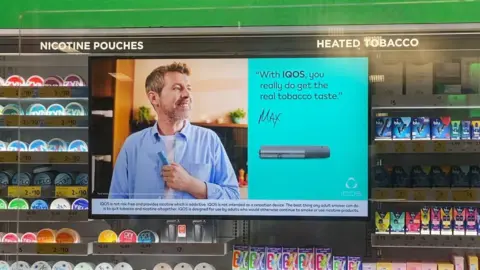### Sainsbury’s and Morrisons Ordered to Cease Tobacco Advertising
In a significant move, the UK government has instructed two major supermarket chains, Sainsbury’s and Morrisons, to halt the advertising and promotion of heated tobacco products, asserting that such activities contravene existing laws. This directive has sparked discussions surrounding the interpretation of tobacco advertising regulations and the implications for public health.
Reports have cited that both Sainsbury’s and Morrisons showcased advertisements in the form of posters and video displays, featuring devices that heat tobacco to generate nicotine-laden vapor for consumers. Initially, both supermarkets defended their advertising practices, maintaining their belief that these advertisements were within the legal framework. However, this official correspondence from the government indicates an emerging stance on the regulation of heated tobacco products, which have gained traction in recent years.
In their responses to the government’s letter, Sainsbury’s noted that they are in “close contact with the government” regarding the issue. Morrisons, on the other hand, stated they would provide a response “in due course.” This indicates a willingness to engage with the government while examining the contents of the claim made against them.
The origin of the ban on tobacco advertising in the UK can be traced back to legislation enacted under Tony Blair’s Labour government in 2002. This law delineated a tobacco product as anything intended for smoking, sniffing, sucking, or chewing. In light of this definition, Morrisons contended that the law does not extend to heated tobacco products since they do not generate smoke, a claim that the government seems poised to contest vigorously.
Advertising for the iQos heated tobacco product, produced by Philip Morris International (PMI), was prominently featured in Sainsbury’s and Morrisons stores, a fact that has raised considerable concern, especially as many of these displays are visible to children. PMI has asserted its position, claiming that it believes the Department of Health’s interpretation of the law is incorrect and insisting that it has adhered to all relevant legal statutes since launching the iQos product in 2016.
Following the government’s letter clarifying its interpretation of the laws surrounding tobacco advertising, a spokesperson from the Department of Health and Social Care (DHSC) reiterated the comprehensive nature of the Tobacco Advertising and Promotion Act 2002, emphasizing that it applies to all tobacco products prevalent in the marketplace. The spokesperson further articulated the government’s commitment to public health, stating, “All tobacco products are harmful to health.”
Amid these developments, recent surveys conducted by the charity Action on Smoking and Health have revealed a notable increase in awareness of heated tobacco products, particularly among younger adults. Alarmingly, nearly 25% of individuals aged 11 to 17 reported familiarity with these heated tobacco products, a marked rise from just 7.1% in previous studies. While the usage rates remain relatively low, approximately 2.7% of respondents in this age group indicated they had experimented with heated tobacco.
Experts have pointed out that, while research on the health impacts of heated tobacco is still evolving, it is generally recognized that, while heated tobacco might be less harmful compared to traditional cigarettes, it is still more hazardous than vaping devices and is not particularly effective for helping smokers transition away from nicotine.
As the matter unfolds, Sainsbury’s has reiterated its stance, arguing that its advertising complies with existing legislation and pledging ongoing communication with the government and industry partners to align with forthcoming laws. Morrisons continues to review the situation, poised to address the allegations with a formal response at a later date.
Ultimately, the resolution of this complex legal issue surrounding the advertising of heated tobacco may require judicial clarification, as no court cases have yet been brought forward. However, with the Tobacco and Vapes Bill currently advancing through Parliament — now at the committee stage in the House of Lords — the landscape of tobacco advertising is set for an overhaul that could encompass comprehensive restrictions on the advertising of all tobacco and vaping products.
In the context of public health advocacy, Hazel Cheeseman, chief executive of Action on Smoking and Health, has voiced urgency for the government to expedite the passing of this law, highlighting the risk of exposing children to tobacco marketing in the absence of timely regulatory action. Given that the Tobacco Advertising and Promotion Act applies consistently across the UK, it is essential for the devolved administrations to align in their regulatory stance to mitigate health risks stemming from tobacco advertising, including heated products.



